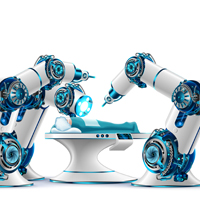 There is room for human error in everything that we do. Despite the years of training that doctors endure, they, too, experience the reality of what it means to be human. And though they work long hours, they cannot be everywhere.
There is room for human error in everything that we do. Despite the years of training that doctors endure, they, too, experience the reality of what it means to be human. And though they work long hours, they cannot be everywhere.
For patients far away, and to help minimize the risk of human error, physicians have now begun to rely upon artificial intelligence (AI) – namely, the Da Vinci Medical Robot.
The Da Vinci Surgical System, launched in 2000, was the very first of its kind to be commercially available in the United States. There have since been 1,700 Systems installed in hospitals across the world.
These robots incorporate the skills of a physician but reduce the potential for human error. As of May, there were about 775,000 successful surgeries performed using the System.
The System acts as the “arms” of the doctor, allowing him or her to perform surgery, even while hundreds of miles away. These robots assist so well that they have become the preferred option in many cancer-related procedures. In fact, three out of four prostate cancer surgeries are performed with the help of them.
Given enough data, artificial intelligence may allow for robots to behave autonomously, performing procedures from start to finish on their own.
While technology has advanced enough to provide us the opportunity to take care of someone from miles away, it has also advanced enough for people to take advantage of it.
All technology runs the risk that someone could feasibly hack into the device. If this should happen, and the robot was to become compromised in the middle of an important procedure, it could have devastating consequences.
Though robots help to minimize the risk of human error, they are not without fault. All machines carry the risk of failure; computers crash, engines fail to start, and robots could very well suffer from defects during manufacturing, assembly, or even during a procedure.
This does not negate the risk of human error when using the robots – the wrong choices can still create negative outcomes. Nothing is ever truly free from error.
From 2005 to 2014, 386 malfunctions occurred in 14,141 procedures. Of those malfunctions, 20.9 percent involved malfunctioning of the arms and instruments.
Whether the patient is left open to human or technological error, the question remains as to who is ultimately responsible for any medical malpractice (negligence). Since AI used in medicine are currently billed as “decision aides,” it seems that they are intended to be used to complement a physician – not to replace him or her.
This means that the physician or health care provider using the AI remains liable for any harm sustained to the patient.
It is also important to note that if something bad occurs, it does not automatically make it the physician’s fault. So long as the doctor adheres to their standard of care, and performs as any other reasonable doctor would in the same or similar situations, they may not be negligent.
As technology rapidly accelerates, determining liability will no doubt only become more complicated. That is why it is so valuable to find a Pennsylvania medical device lawyer at Brookman, Rosenberg, Brown & Sandler with the experience to help you. If you or someone you know has been a victim of medical malpractice call at 215-569-4000 or contact us online for a free consultation.